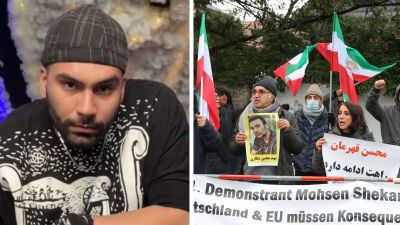Executed Iranian protester 'sacrificed life for his country', says 'proud' family member

As the regime resorts to executing people to crush dissent, in their first broadcast interview a relative of one protester tells ITV News' Lucy Watson that Tehran is becoming 'desperate'
The first known person to be executed over the ongoing wave of anti-government protests in Iran will be "remembered through history", a relative told ITV News.
Mohsen Shekari, 23, was hanged in Tehran on Thursday after just 75 days in custody for his role in the country's current unrest.
On Monday, just a few days after his death, 23-year-old Majidreza Rahnavard was hanged from a construction crane as a warning to the public - the second execution over current protests.
Amnesty International fears others in Iran could also face the death penalty amid the recent uprising, given the thousands of people arrested and indicted. The human rights group said it has identified "at least 18 others at risk of execution" in connection with the recent wave of protests.
Speaking to ITV News, a relative of Mr Shekari's living overseas told how his family hadn't told him of the court case - potentially not to worry him - until the eve of the execution.
"He was an innocent guy... it was shock for me to get that message... I cried so much," he said.
The family member, who wished to remain anonymous due to fear of reprisals, described Mr Shekari as a "very kind and helpful person" who would always go the extra mile for his family.
Asked if he thought the Iranian regime had gone too far with the execution, he said: "I think they're desperate, because so many Iranians now go to the street and they don't accept the unfair justice [system] in Iran."
He said people in Iran want the freedom they experienced before the 1979 Islamic revolution, and that the regime are killing people in an attempt to "send a message" that is no longer being accepted.
Mr Shekari was accused of blocking a street in the Iranian capital and attacking a member of the security forces with a machete, leaving him in need of stitches, according to the judiciary-run Mizan news agency.
He was convicted in Tehran’s Revolutionary Court, which typically holds closed-door cases, which have been internationally criticised for not allowing defendants to pick their own lawyers or even see the evidence against them.
Iran has been rocked by protests since the September 16 death of 22-year-old Mahsa Amini, who died after being detained by the country's morality police.
At least 475 people have been killed in the demonstrations amid a heavy-handed security crackdown, according to Human Rights Activists in Iran, a group that's been monitoring the protests since they began.
At least 61 of the fatalities have been children, ITV News has been told, while over 18,000 people have been detained by authorities.
Iran has a long history of using the death penalty as a tool of political oppression, as documented by Amnesty International.
The human rights charity says it has had the highest rate of executions since 2017, largely due to an increase in drug-related offences - but political prisoners are also put to death.
In the aftermath of the nationwide protests of December 2017 and January 2018, at least one protester, Mostafa Salehi, was executed in August 2020.
Another protester, Navid Afkari, was executed in secret the following month after being arrested over participation in anti-government demonstrations.
In an unprecedented development in recent decades, the authorities also executed dissident journalist Rouhollah Zam in December 2020 in connection with his popular news channel AmadNews, which they blamed for stirring up the 2017 and 2018 protests.
A similar pattern emerged after the November 2019 nationwide protests, as three demonstrators were sentenced to death.
Amirhossein Moradi, Mohammad Rajabi and Saeed Tamjidi's sentences were eventually overturned on appeal after extensive global campaigning.
Even before the current uprising began in mid-September, Amnesty International warned of a spike in executions, with Iranian authorities killing at least 251 people in the first six months of 2022.
The disproportionate use of the death penalty against Iran’s Baluchi minority demonstrates the entrenched discrimination and repression they have faced for decades in Iran.
“Given that the Iranian authorities are adamant on continuing their killing spree, both on the streets and through sham trials, it falls on the international community to urgently take action to stop further executions," Diana Eltahawy, Amnesty International’s Deputy Director for the Middle East and North Africa said.
She continued: "The international community must go beyond expressions of outrage and condemnation and take all necessary measures to pursue accountability for all officials including those in security, intelligence, prosecutorial and judicial positions involved in crimes under international law and other grave violations of human rights, including the right to life.
"This should include exercising universal jurisdiction to investigate all those suspected of such crimes and issuing arrest warrants when there is sufficient evidence."
Despite referring to itself as the Islamic Republic, Mr Shekari's relative says the regime's conduct is worlds apart from the faith's values and ethics.
"How can, can the regime do this to the people? They talk of religion, they talk of Islam, but the religion has never been like this.
"It's their Islam, they have made their own religion to do these cruel things to the people. I don't think any religion in the world would promote this kind of action against people who fight for their freedom."
Insisting that Mr Shekari did not die for nothing, he said: "His name can be remembered through history.
"I'm happy that he sacrificed his life for his country and for the freedom of women. I am proud of, of him. So proud of him."
Want a quick and expert briefing on the biggest news stories? Listen to our latest podcasts to find out What You Need To Know.